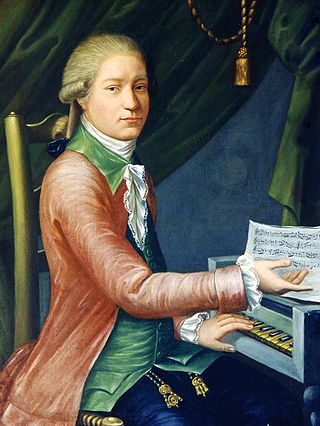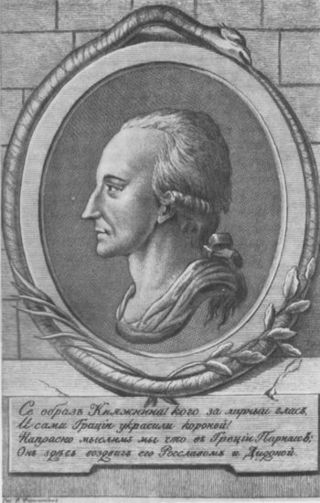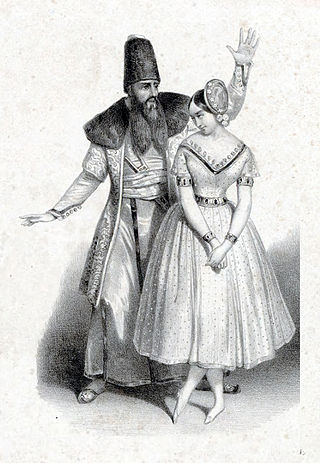Related Research Articles

Anastasio Martín Ignacio Vicente Tadeo Francisco Pellegrin Martín y Soler was a Spanish composer of opera and ballet. Although relatively obscure now, in his own day he was compared favorably with his contemporary and admirer, Wolfgang Amadeus Mozart, as a composer of opera buffa. In his time he was called "Martini lo spagnuolo" ; in modern times, he has been called "the Valencian Mozart". He was known primarily for his melodious Italian comic operas and his work with Lorenzo Da Ponte in the late 18th century, as well as the melody from Una cosa rara quoted in the dining scene of Mozart's Don Giovanni.
Vasily Alexeyevich Pashkevich also Paskevich was a Russian composer, singer, violinist and teacher of Ukrainian origin who lived during the time of Catherine the Great.

Yevstigney Ipat'yevich Fomin was a Russian opera composer of the 18th century
Russian opera is the art of opera in Russia. Operas by composers of Russian origin, written or staged outside of Russia, also belong to this category, as well as the operas of foreign composers written or intended for the Russian scene. These are not only Russian-language operas. There are examples of Russian operas written in French, English, Italian, Latin, Ancient Greek, Japanese, or the multitude of languages of the nationalities that were part of the Empire and the Soviet Union.
Kerzelli is the surname of a large family of musicians of Italian, Czech or Austrian origin, who settled in Russia in the 18th century. They were active in Moscow in the late eighteenth century and known for their contributions to the Russian musical stage.
Knipper Theatre, Kniper Theatre or Knieper Theatre was the venue of a German theatrical troupe led by Karl Kniper which performed in Saint Petersburg beginning in 1775, and ending in 1797.

Catherine II the Great (1729–1796), Empress of Russia was not only an opera fan, a patroness of the arts, music and theatre, but also an opera librettist. She commissioned some well-known Russian and foreign composers to provide music for her texts.

Fevey is an opera by Vasily Pashkevich to a Russian libretto by Catherine II of Russia.
Mikhail Alexeyevich Matinsky was a Russian scientist, dramatist, librettist and opera composer.

Yakov Borisovich Knyazhnin was Russia's foremost tragic author during the reign of Catherine the Great. Knyazhnin's contemporaries hailed him as the true successor to his father-in-law Alexander Sumarokov, but posterity, in the words of Vladimir Nabokov, tended to view his tragedies and comedies as "awkwardly imitated from more or less worthless French models".

Sbiten is a traditional hot winter beverage in Eastern Slavic cuisine, including Belarusian, Russian, and Ukrainian cuisines. Sbiten was a popular drink in Russian cuisine before the appearance of tea in Russia.

Sbitenshchik was a sbiten vendor and was spread in Old Rus' regions of Novgorod, Kiev, Moscow and other Rus' cities and regions. The vendor was engaged for the preparation and serving of the traditional honey-based beverage sbiten in Rus' that has been around since the 12th century. Sbitenshchik often worked on the streets to cook the drink and to sell it to the freezing people during the winter. The vendor is documented in the Russian Lubok prints. Sbitenshchik became 1783 the main theme of the popular comic opera The Sbiten Vendor by Yakov Knyazhnin with music by Czech composer Antoine Bullant.

Catterino Albertovich Cavos was an Italian composer, organist and conductor who settled in Russia. He played an important role in the history of Russian opera and was the father of Alberto Cavos.
Stepan Ivanovich Davydov was an Imperial Russian composer and singer. He was born in Chernihiv in the Russian Empire.
The Two Stars or The Stars or The Two Little Stars is an Anacreontic ballet in 1 act, with choreography by Marius Petipa, and music by Cesare Pugni. Libretto by Marius Petipa, based on an ancient Greek myth.

Le Diable amoureux is a ballet-pantomime in three acts and eight scenes, originally choreographed by Joseph Mazilier to the music of Napoléon Henri Reber and François Benoist. The libretto by Jules-Henri Vernoy de Saint-Georges is based on Jacques Cazotte's 1772 occult romance The Devil in Love. The work was first presented by the Ballet of the Royal Academy of Music in Paris on 23 September 1840, with Pauline Leroux, Mazilier, and Louise Fitz-James.

Le Poisson doré is a "fantastic ballet" in 4 acts/6 scenes with prologue and epilogue. The choreography was by Arthur Saint-Léon, and the music by Ludwig Minkus.
Imperial Theatres of Russian Empire was a theatrical organization financed by the Imperial exchequer and managed by a single directorate headed with a courtier director; was pertain to the Ministry of the Imperial Court from 1742.
Gennaro Astarita was an Italian composer, mainly of operas. The place of his birth is unknown, although he was active in Naples for many years. He began his operatic career in 1765, collaborating with Niccolò Piccinni in the writing of the opera L'orfana insidiata. He became the maestro di cappella in Naples in 1770.
Arina Matveyevna Sobakina, was a Russian ballerina and stage actress performing as a "comic dancer". She belonged to the pioneer group of professional stage artists in Russia.
References
- Aleksandr Polovtsov. Бюлан, Иван // Russian Biographical Dictionary (Русский Биографический Словарь)
- Barry S. Brook, Richard Viano, & Jitka Brabcová: "Antoine Bullant", Grove Music Online ed. L. Macy (Accessed December 4, 2008), (subscription access) Archived 2008-05-16 at the Wayback Machine